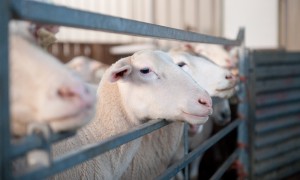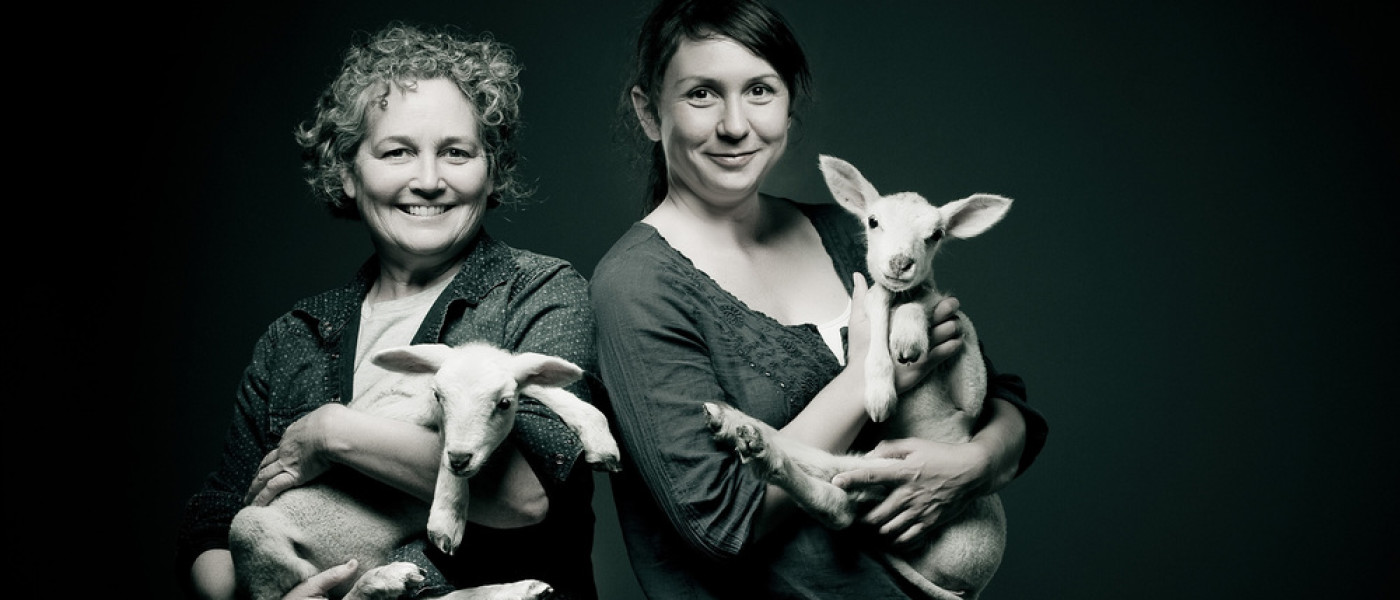Sarah Hoffmann and Jacqueline Smith run Green Dirt Farm, one of about 150 sheep dairies in the United States. Their farm, in Weston, Missouri, produces farmstead sheep’s milk cheeses, yogurt and 100% grass-fed lamb, making it difficult to believe that just 14 years ago, neither woman had any agricultural experience. In 2012, they launched Only Ewe, a collaboration between Green Dirt Farm and other local sheep dairies that are transitioning feed from concentrated grains to grass.
“We wanted to create sustainable work for ourselves and that means to us a lot of things: one, sustainability means that it can supply us with enjoyable work so it sustains our emotional and our spiritual sides and fulfills us,” says Jacqueline. “Two, it’s sustainable so that we’re contributing to the protection of our environment instead of depleting the environment. And three, that we can make a living doing what we’re doing and what we love to do.”
Green Dirt Farm
Green Dirt Farm was started in 2000 when Jacqueline and Sarah, who both come from non-farming backgrounds, decided to start a farm and have it be their primary jobs. Sarah and her husband owned a 25 acre plot in Weston, located about 40 miles northwest of Kansas City, and after a great deal of research, the two women came to the agreement that sheep dairying would be the best fit for their operation.
“We looked into making artisan cheeses and farmstead cheeses and looked at the topography of the ground and of the soil,” explains Jacqueline. “We realized that cows would be too heavy on this topography because it’s really steep rolling hills and beautiful, deep valleys and the soil moves very easily.”
While sheep’s milk was beginning to enter the marketplace, Jacqueline says sheep dairies were and still are a somewhat untapped territory. There are very few people who are experts on sheep dairying and little written academia on processing sheep’s milk, so Jacqueline and Sarah had to dig to find information.
“When we started, we didn’t know anything about sheep dairying, we didn’t know anything about cheese making, we didn’t know how to grease tractors, and we didn’t know how to build a fence,” says Jacqueline. “We had completely raw land that was all row cropped. We spent from 2000 to about 2008 just learning.”
It took a long time but slowly the women went from writing business plans and experimenting with cheese making to completing their USDA Grade A dairy and their FDA-certified processing plant, which they fondly call their “cheese kitchen.”
They initially sold their product at farmers markets, but once their cheese production picked up, Jacqueline and Sarah began selling to restaurants, local retail areas and then expanded to higher-end grocery stores in the Midwest and large distribution chains across the United States.
Green Dirt Farm now milks about 300 sheep. In order to have enough ewes to milk, Jacqueline and Sarah found themselves with a larger number of offspring than they needed. Seeing a great business opportunity, they began selling 100% grass-fed lamb, which are slaughtered at an Animal Welfare Approved facility nearby. Animal Welfare Approved (AWA) is a food label for meat and dairy products that come from farm animals raised to the highest animal welfare and environmental standards, and Green Dirt Farm proudly bears the AWA label.

Photo © Duncan Travis Photography
Jacqueline and Sarah’s sheep are rotationally grazed, so every 24 hours, they are moved to another paddock and do not return to that paddock for 60-90 days. Having enough healthy grass for this number of sheep to graze was just another challenge these women faced.
“All of the land that we acquired was either in tobacco, soybean or corn when we took it over,” says Jacqueline. “It takes a long time to establish native pastures again so we’re working towards improved pastures continually and trying to build up the soil instead of depleting it.”
With the soil quality continuously improving, Green Dirt Farm is getting closer to its goal of becoming a 100% grass-fed dairy.
In order to keep their operation running, Green Dirt Farm has seventeen full time employees, including Jacqueline and Sarah. The roles range from farm hands, milkers and cheese-makers to packagers, delivery drivers, office managers and sales and marketing people.
“We do everything from soil to plate,” Jacqueline says.
Only Ewe
Because there are so few sheep dairies, Green Dirt Farm is very unique and quickly began gaining recognition in the area. Jacqueline and Sarah began receiving calls from farmers who wanted to know if Green Dirt Farm could use their milk. They were all cow dairies who had signed contracts to transition from conventional dairying to organic dairying, but following their transitions, their contracts were dropped.
“These farmers who had spent all this money and infrastructure becoming organic all of a sudden didn’t have a market,” says Jacqueline. “They contacted us to see if we could use their milk, but we’re a small facility. Cows produce a lot more milk than sheep and there’s just no way we could take cow’s milk. But we know sheep’s milk.”
Jacqueline and Sarah wanted to support their community while still producing sustainable food and staying true to what they know how to do, so they decided to invite these farmers to join a program that would focus on sheep’s milk as an alternative source of income. This brought about the creation of Only Ewe.
“We can make a living doing what we’re doing and what we love to do.”
Only Ewe currently involves four farm families that operate cow dairies as their main source of income. Jacqueline and Sarah made an agreement with these families that if they began raising a small number of sheep, Only Ewe would buy the sheep’s milk. Upon entering this program, all farm families sign a pledge agreeing to move toward becoming grass-based and Animal Welfare Approved farms, transitioning from a confinement model for animals to more sustainable practices. These farmers do not have to make the transition to completely grass-based right away, as Jacqueline and Sarah know first-hand that it takes time and money to do so. But they do need it to be the end goal for their farms. Jacqueline and Sarah are using an Animal Welfare Approved third party audit to help work with these families on environmental farming and animal well-being.
“We’re still very small and it’s just starting,” explains Jacqueline. “We literally are launching right now with this new project. We have four farm families but we hope to expand to as many at the project will allow us to. It’s a supplemental income for these families so they milk fewer than 200 ewes so that the new operation does not inundate their land with animals.”
The women hope the demand for sheep’s milk products will continue to grow, allowing the farm families involved in the Only Ewe project to flourish and allowing more farm families to join.
“The goal for these farmers is that the demand for sheep’s milk will eventually outweigh the demand for the cows’ milk,” says Jacqueline. “Until then, I’m not willing to put anyone out of business by telling them that they can only have one source of income.”
Only Ewe has been producing plain yogurt for some time now and just released three new flavors: maple, cranberry peach ginger and blueberry rosemary. While these products are being sold locally and through larger distribution chains across the Midwest, Jacqueline hopes the demand will continue to increase, allowing the project to help more and more farmers. She hopes people will become more interested in not only sheep’s milk products but also in eating food that is grown sustainably.
“Hopefully Only Ewe is positioned so that it can ride the curve of people becoming more aware of how beneficial sheep’s milk products are for our health standpoint and also how good grass-fed is as well.”
Until then, Jacqueline and Sarah will just keep doing what they are doing and continue to enjoy fulfilling their dreams and living the lives they wanted.
“It’s been cool the fact that we’ve been able to do this for a long time without burnout, and our passion is still very fierce,” says Jacqueline. “It’s good. It keeps us going.”
Watch this video from 2011 to see Jacqueline talk about Green Dirt Farm, the sheep, and their cheese.
Further Reading
- Learn more about labels like Animal Welfare Approved on our page Food Labeling: Organic, Fair Trade, Natural and More Explained.
- Farmers in the dairy business face many challenges. Find out more in Dairy: Family Farmers in Crisis.
- To find food from family farmers like Jacqueline and Sarah in your area, check out our Find Good Food page.




